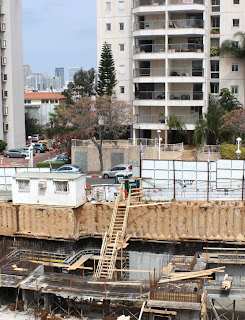Opportunity for Americans: Israeli Luxury Home Market: Turning Normal?
Israeli real estate market has been in
an upmarket phase for over two decades. Luxury homes and apartments
were the engine that drove building and architecture fields into a
strong and growing market segment. Luxury construction has even
become a vital export segment. Israeli architects and builders are
exporting construction services due to their luxury construction
experience. Finally, luxury construction has been a key Israeli
success story, to the point, of attracting investors and individuals
to buy homes in Israel, bringing in dollars and euros. With all that,
it seems like the luxury propery party is over, or at least taking a
rest. Luxury apartments in the Tel Aviv area are not selling in 2012
as fast as they did earlier. Also, high visibility projects with very
high price units (above 100 million shekel per property, about $50
million) are also sitting without much interest. (where are Ellison,
Brofman, and Adelman when you need them?)
The first question to ask is: “did
builders reached the peak of luxury and price?” If a 200
million shekel penthouse does not sell, it does not mean that a 20
million shekel unit just two floors down will not sell. Another
question: “is the luxury property market saturated?”
But sales are not totally dead, just not keeping up with construction
output. Whatever the answers, everyone is worried about possible
collapse of prices, similar to the US and Europe. The Israeli real
estate market is not driven by speculation and is less leveraged than
other markets. For the most part, large inventory is not sitting
around empty (like in other markets.) Finally, the amount of defaults
by individuals and more important by builders and investors, is not
increasing at an alarming rate. More important, banks are not
suffering (and closing) as in other countries. Obviously, some
architects and builders have invested and are leveraged heavily. They
are stuck and are sometimes forced to re-negotiate their credit terms
with investors and banks. What we see so far, is simply people
“sitting” on their properties. When a building is
not selling, prices are reduced by only a few percentage points (3%
to 10%), or attractive incentives are offered.
Just to get a feel, here are a few
developments we see. Buildings in construction, within a year of
finish are offering 20% down payment and the rest at delivery. This
is a new development in our market, where full payment was usually
required six months before a building is finished. One project in
Ramat Gan has stopped interior finish work and is selling “4
walls and sand floor” at 500,000 shekel discount. They
claim an apartment can be finished for as little as 200,000 shekels.
Would luxury apartment buyers or investors want to manage final
construction on their own? (see, Globes article: Israel's Luxury home
market stagnating:
http://www.globes.co.il/serveen/globes/docview.asp?did=1000853188&fid=2167
) Finally, finished apartments, especially in larger developments,
are being offered in “sales fairs”. Some are targeted at
specific segments like government workers, young families, or
independent workers. Targeted marketing seem to go with some
financing deal the government or a bank has to offer.

Comments